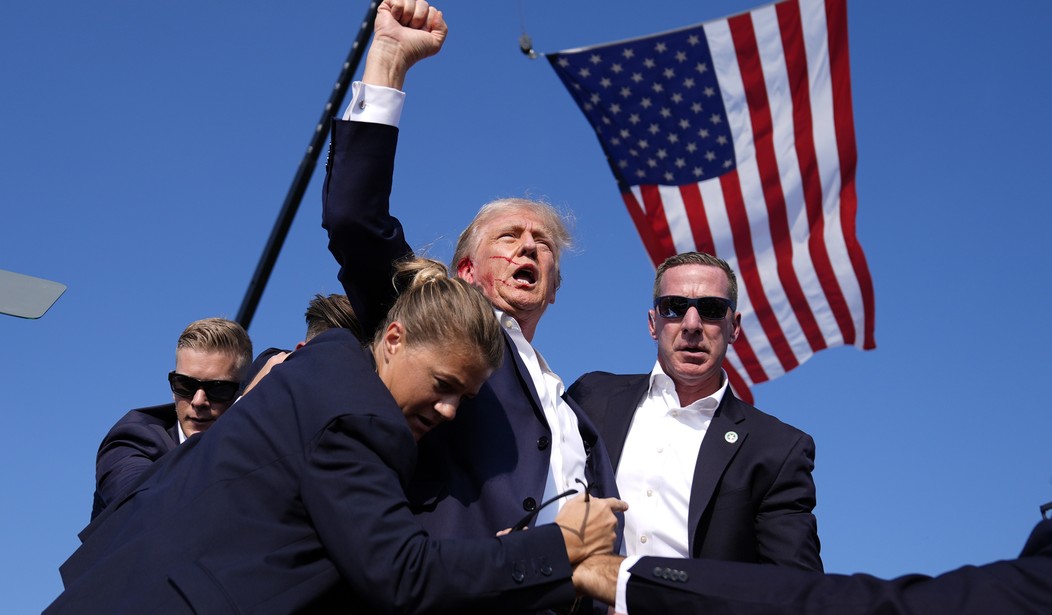On one hand, the suggestion that Donald Trump use indoor venues for his rallies -- or at least enclosed stadiums -- probably occurred to everyone at about 7 pm ET on July 13th. Obviously, security issues would be less complicated by enclosed venues, and crowd control, metal detection, and secure egress under attack could get planned more effectively.
On the other hand, do we really want to give the Secret Service a kind of Peter Principle* veto power on political rallies -- especially after the breathtaking incompetence on display in Butler County, PA? Somehow, the failure to secure an easily accessible roofline 130 yards from the stage doesn't sound like an esoteric point of failure for a supposedly world-class personal-protection operation, nor a signal of indoor excellence:
Secret Service officials encouraged Donald Trump’s campaign to stop scheduling large outdoor rallies and other outdoor events with big crowds after the assassination attempt on the former president in Butler, Pa., according to people familiar with the matter.
In the aftermath of the shooting, agents from the Secret Service communicated their concerns about large outdoor rallies going forward to Trump campaign advisers, three people familiar with the matter said. ...
For upcoming events, Trump’s team is scouting indoor venues, such as basketball arenas and other large spaces where thousands of people can fit, people familiar with the request said. The campaign is not currently planning any large outdoor events, a person close to Trump said.
After what happened in Butler County, perhaps Team Trump had already reached this conclusion without the Secret Service suggesting it. Would you trust the USSS again after July 13 with protecting your meal ticket at an open-air event? Especially given the blizzard of baloney that the agency has produced ever since?
Still, this request doesn't make a lot of sense as a permanent ask. According to the now-departed Kimberly Cheatle, the USSS needs 60 days just to figure out what went wrong, let alone to start on fixing all of the failures that took place. Members of Congress in both chambers and parties are none too pleased with that claim, especially since Trump, Hillary Clinton, and Joe Biden have all held outdoor events in the last three election cycles without apparently leaving them exposed to close-in sniper fire.
The problems here aren't related to the venues, and everyone knows it. It's incompetence in its most basic form to leave a roofline unsecured within 130 yards of a stage. It's incompetence in its most basic form to not secure an outer perimeter and let people wander in that close to a secured event. Indoor venues may make security planning easier, but they do not cure incompetence. If an amateur like Crooks could pierce the USSS security bubble this easily, then someone with better training and experience could figure out a way to deal with an indoor venue at this level of competence.
This sounds like a way to slough off responsibility for the failure onto the campaign, but it won't work. The USSS response to this abject failure has angered Republicans and Democrats alike, and the "resignation" of Cheatle will not end matters for the USSS or the Department of Homeland Security. Sen. Chuck Grassley stepped up the pressure on DHS Secretary Alejandro Mayorkas to start providing answers to key questions about the Secret Service failures on July 13:
NEW My office has obtained docs from law enforcement on July 13 assassination attempt of Pres Trump I’m writing Secret Service Acting Dir Rowe & DHS Scty Mayorkas AGAIN 2get badly needed answers/clarity pic.twitter.com/LyQMzYGCkD
— Chuck Grassley (@ChuckGrassley) July 23, 2024
We can't wait 60 days to find out whether the USSS can get its act together, indoors or outdoors. We need the truth of what happened to allow this assassination attempt to take place, the truth behind the murder of one attendee and the wounding of several others, and the truth of whether the USSS can be salvaged or whether we need to start over from scratch on protection services for this nation's leaders.
We can handle the truth, even if the USSS can't handle the roofs.
* - For those who aren't familiar with it, the Peter Principle posits that people tend to rise to their level of incompetence in any organization. Laurence J. Peter and William Hull wrote a very insightful and amusing book about this tendency in 1969, which they apparently intended as satire but turned out to be a very good explanation for corporate failures. I highly recommend the book, perhaps especially for understanding dynamics in politics. Scott Adams' The Dilbert Principle is an equally amusing and trenchant update.








Join the conversation as a VIP Member